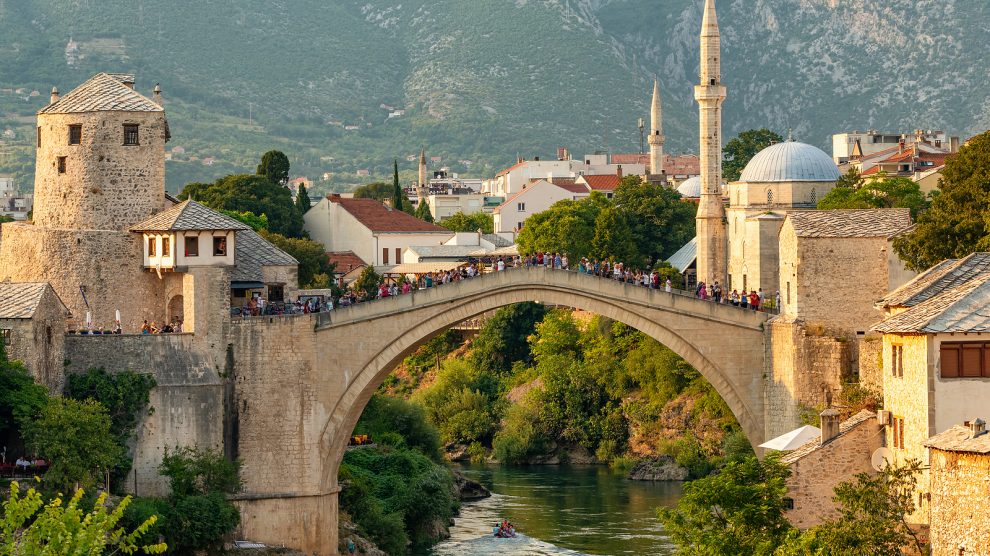Our weekly digest of articles about emerging Europe published elsewhere this week, all of which caught our eye and all of which are well worth your time. Listing them here, however, does not necessarily mean that we agree with every word, nor do they necessarily reflect Emerging Europe’s editorial policy.
Whither Bosnia?
The future of Bosnia and Herzegovina remains the subject of intense debate. To mark the 25th anniversary of the Dayton Peace Agreement, members of the Wilson Center’s Working Group on the Western Balkans issued a report with recommendations entitled Fixing Dayton. In the spirit of debate, Robert M. Hayden, professor at the University of Pittsburgh, commented on the report, whose authors responded.
Zelensky takes on Ukraine’s oligarchs in bid to court Biden
Volodymyr Zelensky’s move last month to shut down three television channels that are linked to a multi-millionaire politician close to the Kremlin has raised hopes that the Ukrainian president is preparing for a wider crackdown on the country’s powerful oligarchs.
Romania reveals the limits of China’s reach in Europe
Bucharest has struck a far bolder stance than most Western European countries in saying no to China. Not only has Romania booted Chinese companies out of core sectors like nuclear power and telecoms, but it also last month delivered a scathing diplomatic rebuke to Chinese leader Xi Jinping when it refused to send its president to a landmark summit, despite persistent diplomatic hectoring from Beijing.
Georgia is suddenly making international headlines. But its crisis isn’t new
The reality is that the country’s elite, currently squabbling over power, is completely out of touch with their citizens.
Turkmenistan: The long arm of the police state
It is a matter of great frustration to Turkmenistan’s government that it cannot easily persecute foreign-based critics. Not that it stops them from trying. And often succeeding.
Janez Janša, Slovenia’s Marshal Tweeto and the media
Slovenian Prime Minister Janez Janša is waging an ongoing war of words on Twitter against critical journalists, accusing them of lying and spreading fake news. Now the EU has criticised Janša’s dealings with the media.
Will Uzbekistan allow an opposition candidate to run for president?
Recent events further dim already bleak hopes for a free and fair presidential election in Uzbekistan later this year.
Three days that shamed the world
Six years ago at the Cannes Film Festival, the Bosnian film director Jasmila Žbanic pitched a storyline for Quo Vadis, Aida?, a movie about the Srebrenica genocide. Žbanic, a Bosnian who’d grown up during the siege of Sarajevo and graduated from the prestigious Academy of Performing Arts, had already made several award-winning films. She was thought of as a stirring young talent. However, the producers were not impressed. Now, the Oscar-nominated film is teaching young Bosnian Serbs about the Srebrenica massacre.
Why a Polish teen set up a prize-winning fake cosmetics shop
Disturbed by reports of rising domestic violence under coronavirus lockdown, a Polish high school student decided to launch a fake online shop to offer a lifeline to victims trapped in their homes.
My Favourite War: The animated memoir on growing up in Cold War Latvia
Living on the westernmost edge of Latvia — and of the Soviet Union — in the 1970s, the nearby beach was off limits, in case citizens of the self-proclaimed “happiest country on Earth” would swim away, ostensibly to other, less happy nations.
Berlin Film Festival: Radu Jude’s Bad Luck Banging Or Loony Porn scoops Golden Bear
Bad Luck Banging or Loony Porn, a modern day satire from Romanian director Radu Jude, won the Golden Bear for Best Film at the Berlinale, or the Berlin International Film Festival.
Read a review of the film here.
Unlike many news and information platforms, Emerging Europe is free to read, and always will be. There is no paywall here. We are independent, not affiliated with nor representing any political party or business organisation. We want the very best for emerging Europe, nothing more, nothing less. Your support will help us continue to spread the word about this amazing region.
You can contribute here. Thank you.








[…] Source link : https://emerging-europe.com/news/whither-bosnia-elsewhere-in-emerging-europe/ Author : Publish date : 2021-03-07 00:01:11 Copyright for syndicated content belongs to the linked Source. Tags: BosniaemergingEurope Previous Post […]
[…] Whither Bosnia? Elsewhere in emerging Europe – Emerging Europe Whither Bosnia? Elsewhere in emerging Europe Emerging Europe […]
[…] Source link […]